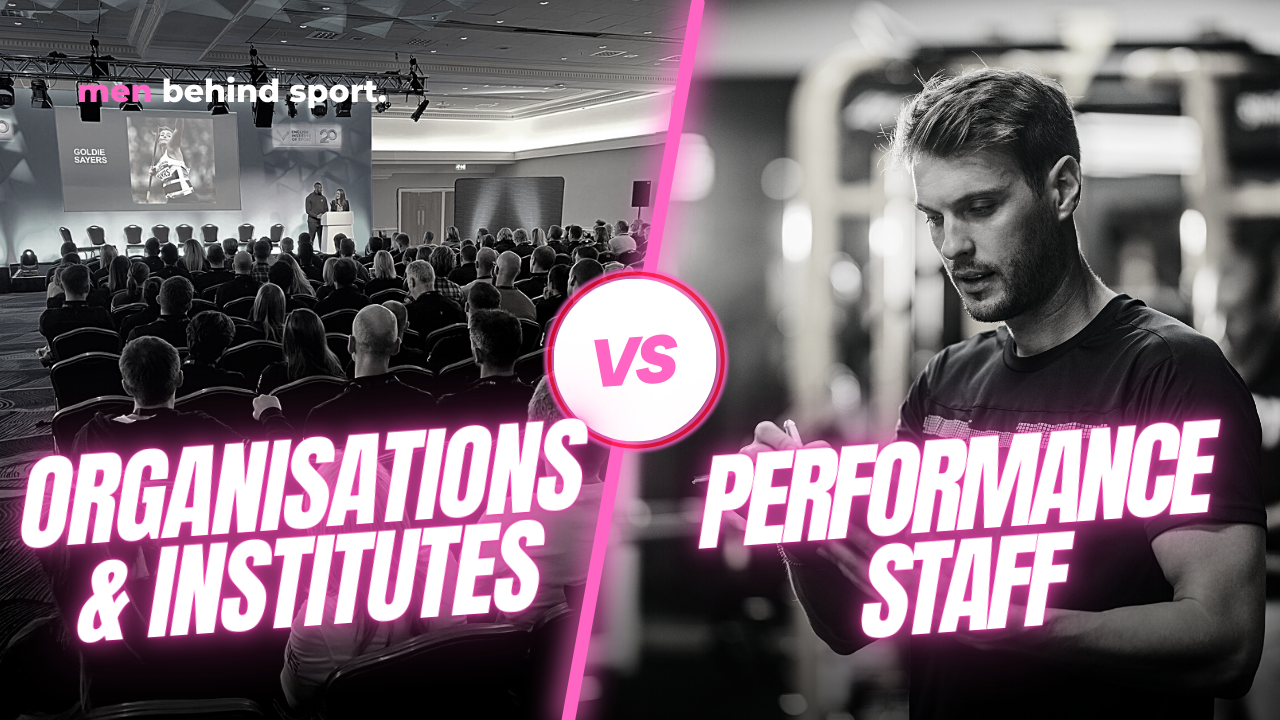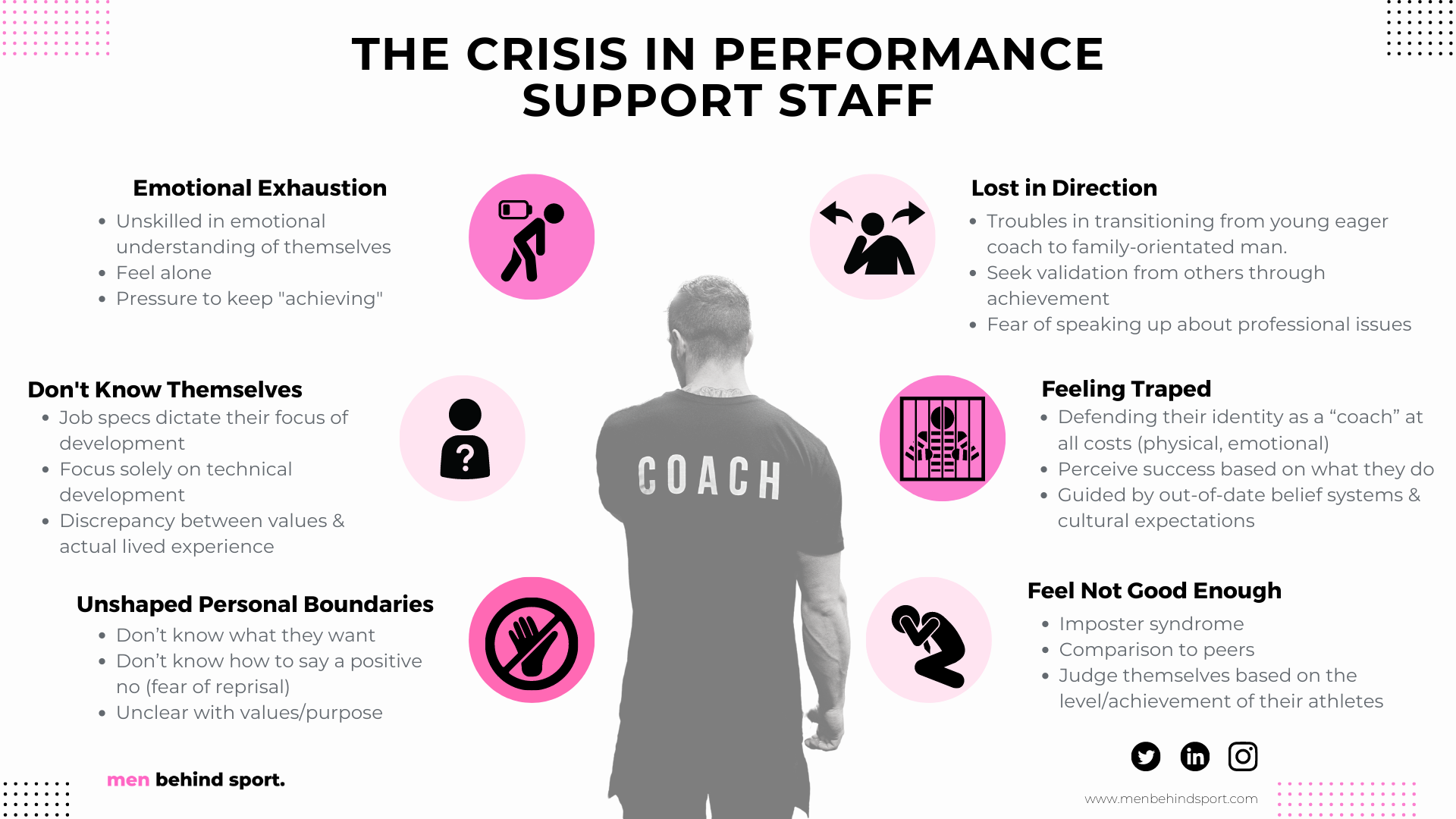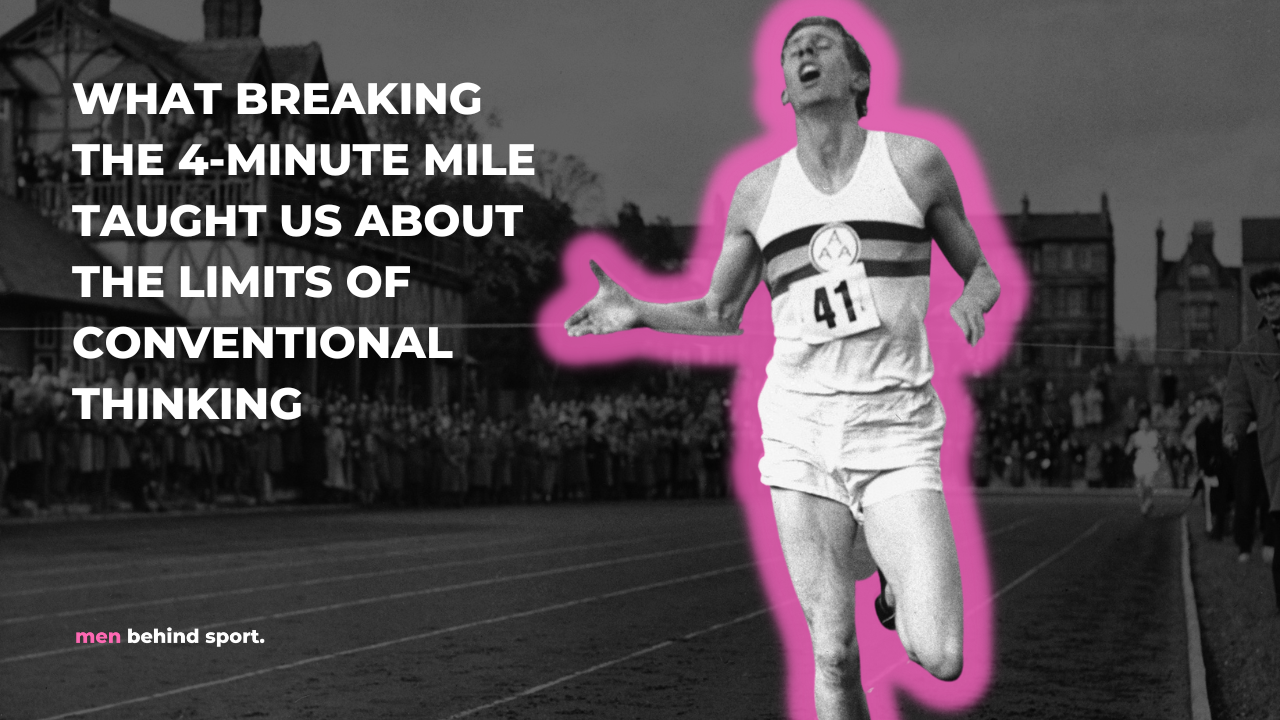
Organisations & Institutes vs Performance Staff (Part 1): Taking Personal Responsibility
Feb 02, 2023The Problem
We are at a time of evolution within the high-performance sports industry we love.
The reason is that, more than ever before, we are hearing the real accounts of the cost of high-performance sport on the men and women supporting athletes at their own expense.
This is not new. Rather we’re at a tipping point where significant numbers of performance staff are leaving the industry.
In 2022 we saw a record number of coaches walk away from their posts in an attempt to protect their health and well-being. This is part of a larger trend we’re witnessing in people leaving poor working conditions to protect their own well-being due to:
- Burn out
- Physical illness
- Mental illness
- To save their marriage
- To be present as a parent
- To live their life

This is more prominent in some sports than others, professional football being a prime example. You can read more detail on this here.
But make no mistake, the majority of high-performance environments are experiencing this on some level.
Breaking Down Barriers
It is becoming increasingly apparent that performance staff are making choices about how they are going to live their lives. They want to work in environments where they are respected, valued and “seen.”
This means that leading figureheads in organisations who aren’t intentional about their culture or who foster work environments based on their blind spots around what is “acceptable” and the “myth” of normal, may experience more proverbial “take this job and shove it” moments than at any time in the past.
Of course, there are hundreds of applicants waiting in line to step into the hole left. And they may fill it with great skills and competence. But make no mistake, they will succumb to the same fate that this movement in performance staff wellbeing is pointing out.
At first glance, this seems a stalemate, with the vastly greater supply of coaches ready and waiting to fill the limited roles left by coaches seeking their life back. Leaving many feeling like we need to “like it or lump it.”

However, I want to remind you of what breaking the 4-minute mile taught us about the limits of conventional thinking.
Runners had been chasing the goal seriously since at least 1886 before it was broken by Roger Bannister in 1954. Until that point, it had become as much a psychological barrier as a physical one. And like an unconquerable mountain, the closer it approached, the more daunting it seemed.
But once Bannister finally broke it, it took just 46 days to be broken again. John Landy, an Australian runner, broke the barrier with a time of 3 minutes 58 seconds. Then, three runners broke the four-minute barrier in a single race just a year later. Over the last half-century, more than a thousand runners have conquered a barrier that had once been considered hopelessly out of reach.
Just because you can’t see the change happen, doesn’t mean it’s not inevitable. And with that change will come a flood of innovation within this space that, I believe, will revolutionise performance sport. In terms of both advances in human performance, with advances in how we connect, collaborate and innovate together as humans who happen to be performance staff.
This leads to the question, where do we start…?
The Start: Taking Personal Responsibility
“No great improvements in the lot of mankind are possible, until a great change takes place in the fundamental constitution of their modes of thought.” - J.S. Mill
The definition of an organisation is:
“An organised group of people with a particular purpose.”
Before we can talk about managing groups of people, we have to start with us as individuals first.
We need to actively engage in understanding what support we need as a man/women, before developing technical skills. This helps the organisations we work for to support us.
Humans are fallible… all of us… with our past experiences laying down operating systems that influence our present until we learn to detangle ourselves.
Part of this is our deeply tied attachment to roles & identities within our life. These roles serve us at some point, but sooner or later we outgrow them. We change as life changes, and resisting that is one of the core reasons we suffer so much.
"As a man, I feel like I've had to sort my own problems out and self-soothe, I can't talk to anyone about it as the roles I take on include provider and protector. If ever I feel like speaking up it's such a brief moment. If there isn't anybody there that isn't sympathetic then I'm just going to have to expect not a great reception or just shut up shop.”
“We are continually concerned about having athletes with narrowly limited identities, but look around and show me a staff member who isn’t at risk of burnout and isn’t being exploited for their passion and identity.”
Reflection:
- Do you ever consider and question what operating system you have within you that governs the type of man you show up as on a daily basis?
- Or does your operating system run in the background while quietly influencing your daily actions?
The Figure Front
“The figure front is a divorced male who works all the hours.”
The potency of this final quote from a coach in elite football really highlights a conundrum:
- Who is actually leading?
- What holes do they have in their person that is being transferred to you and the rest of the support staff?
- What is at the core of their drive to achieve success in sport? In other words what aspects of themselves are they trying to fulfil in their pursuit of perceived “excellence?”
- Do they feel that medals and achievements will fill that sense of lack and low self-esteem that they have carried with them since childhood?
- Are they even aware of the potential of that?
The external opinion on whether you are good or bad is most often based on the result of the athlete you work with. This perspective can even be shared by some within the performance staff team but usually, a longer period of results will once again determine this judgement.
Much of this form of appraisal is accepted by performance staff as being part of the job but what is the underpinning foundation of the need to evaluate performance like this? Are there alternative ways of doing so?
How we feel about ourselves, and the joy we get from living, ultimately depend directly on how the mind filters and interprets everyday experiences.
Our perceptions and beliefs guide our thoughts, feelings and actions. Without checking ourselves I believe many of us are led by an out-of-date operating system of what it is to be a man (or woman). Leaving us susceptible to solely gauging our "success" on what others perceive as successful.
I feel this is the case for many of the challenges performance support staff are encountering.
My Example
My beliefs and perceptions were significantly influenced by my father. My father was tormented with emotional pain and as far as I can tell never worked on it. That showed up within him as a barely functioning alcoholic.
This was part of the reason he was paralysed by a severe stroke when I was 13yrs and then subsequently died when I was 16yrs. He was doing his best with the tools he knew. So my models of being a man were not set on solid ground, leaving me with a skewed sense of self-worth.
As a professional strength and conditioning coach these models showed up in using my roles as a veneer to hide behind the athletes I worked with. In hindsight, I learnt that a large portion of why I worked in professional sports was because of the validation I received - meaning I could temporarily fill that sense of lack within me.
This resulted in putting my job before everything else in my life, including myself. It meant I had no personal boundaries because I was a yes-man. I attached my own value to the objective measures of success I heard others discussing and achieving e.g. medals won, seniority, presenting fancy data, papers published and conferences spoken at.
I never questioned any of this until my destructive patterns in adulthood became a problem for me and the people in my life. This is what began my investigation of my sense of self. Through understanding these unseen layers I learnt what it truly is to become a man. How to own my anger without shame, how to open to my emotional wounds, how to show up authentically in my integrity, how to stand true to my values and how to hold space to understand who I am.
This matters, because I limited the impact I could have as a coach. The limits within me meant I was always going to be blind to the limits of the athletes I worked with. Even if I could see their deeper limits, I was unskilled in how to support them because I hadn’t learnt how to support and free myself.
Creating an Impact
“When we are no longer able to change a situation, we are challenged to change ourselves.” ― Viktor E. Frankl
Physical performance cannot be separated from mental performance. The mind affects the body, the body affects the mind. Thoughts are the language of the brain, feelings are the language of the body. Thoughts affect feelings, feelings affect thoughts.
Our human experience happens to include us being high-performance practitioners. And the athlete is just a small facet of the whole person we choose to work with on a weekly basis.
For me now, successful performance staff will be skilled in not only the technical elements within their discipline and sport, but they’ll also be able to hold space for the emotional and spiritual aspects of the human experience.
Before you turn your nose up at this, it can be thought about in a very tangible way. And a great place to start is Harvard's Sacred Design Lab, which is a soul-centred research and development lab.
At the core of what they do is to translate ancient wisdom and practices to help develop products, programs, and experiences that ground people’s social and spiritual lives.
"When people start to lose a sense of meaning and get disconnected, that's where disease comes from, that's where breakdown in our health — mental, physical, social health — occurs," Psychiatrist and neuroscientist Bruce Perry
In simple terms, spiritual and emotional foundations include:
- the need to love and be loved.
- the need for meaning and purpose.
- the need for support and hope.
- the need for dignity and respect.
It describes our ability to cope with everyday life and reflects our thoughts and feelings. It’s where we feel a sense of belonging and social inclusion. And embodies the way we communicate with others, our relationships, values, needs, beliefs, and lifestyles.
Among psychologists, there is a wide-ranging consensus about what our core needs consist of. These have been variously listed as:
- Belonging, relatedness, or connectedness.
- Autonomy: a sense of control in one's life.
- Mastery or Competence.
- Genuine self-esteem, not dependent on achievement, attainment, acquisition, or valuation by others.
- Trust: a sense of having the personal and social resources needed to sustain one through life.
- Purpose, Meaning, Transcendence: knowing oneself as part of something larger than isolated, self-centered concerns, whether that something is overtly spiritual or simply universal/humanistic, or, given our evolutionary origins, Nature.
A major contributing factor to why performance staff too often get to a breaking point is because they are either unaware of these, or the work environment is requiring them to continually live and work out of alignment with them.
“It is my contention that by its very nature our social and economic culture generates chronic stressors that undermine well-being in the most serious of ways, as they have done with increasing force over the past several decades.”
― Dr Gabor Maté
As a culture, we're so fast asleep to the skew of what's accepted as "normal" that we can't see the obvious - even when it affects our own life.
Unmet needs for meaning and connection play out in the way we live, love, work, and lead. The solution, therefore, is to develop our meaning and connection:
Belonging
The experience of belonging changes the way we show up, stimulating loyalty, compassion, and joy, and diminishing anxiety, loneliness, and fear. But belonging is not a passive state. It’s something we must nurture, express, renew, savour, and pass down. So much in our culture works against us meeting our need for deep connection: to ourselves, other people, place, story, and time.
Application: As an individual, this starts with our relationship with ourselves. An example of being skewed with this is how so many performance staff allow their health and relationships to suffer because they simply don’t have the energy. The cause of this is that they put everyone ahead of themselves, which leaves nothing left for them. Usually out of misguided loyalty and devotion to the “cause.”
If you don’t choose how to use your time, others will choose for you. If you don’t choose what is important, others will choose for you. If you don’t choose what to think or believe, others will choose for you.
If you’re the leading figure front in your department, you must be the first person to reflect this. If you don't make time for your well-being & happiness, you will be forced to make time for your illness!
Freedom to Express
Without commitment beyond our self-interest, we can’t build the resolve to dismantle systems that are broken. True freedom is more than something we think; it’s something we do. So we commit ourselves to constant learning, reflection, action and practice. Refusing to use shame as a strategy, we invite our colleagues to lead with honest and authentic heart-based logic.
Application: Making colleagues feel shame for taking a day off is an example of exactly the type of skewed self-interest I mean. The result of this is that many performance staff lose many days of annual leave due to an assumption & fear of looking bad.
It’s on us as individuals to call this out, and to be honest and authentic with what we need. As much as we put it on a pedestal, our careers in sport are simply just a job. As simple as that. So away from pre-season tours, there are no situations that should stop us from taking our annual leave. It’s literally written in black and white on the contract we signed.
Collaboration
Our culture devalues presence, patience, kindness, and care. Deepening meaning and connection takes courage, perseverance, and trust.
How we are together shapes what we do together. We need to centre relationships even as we focus on outcomes, reject grind culture, and embrace our agreed commitments. We show up with joy, integrity, and care.
Whether you know it or not. Whether you like it or not, your attention and inner state are the modern-day currency of gold. Until you become aware of that your attention and creative thinking will be significantly diminished.
Application: To effectively collaborate, we must master the skill of unlearning our own immune system's defensive response to protect, which results in ego, silence, conflict avoidance, fragility and defensiveness.
When teamed with others you know and trust, able to rely upon each other to navigate uncertainty and give you truth about your blind spots, operating in the dark is no longer such a daunting task.
If you're not training this skill, you're letting the external environment control you. And you're letting your physiology point you in the direction of reactive conflict and finger-pointing, rather than a place of clarity in response.
- How often are you guided by trying to look good for your achievements?
- Do you feel comfortable putting your hand up to your peers and colleagues to say "Can you help, I just don't know the answer to ....?"
- Are you aware of when your assumptions take over and guide your judgements and decisions?
Conclusion
If you’re still reading then I hope you’ve felt the passion and inspiration that I feel from writing this.
In Part 2 of this series, I answer the question:
“What role do organisations & institutes have to play to provide space to develop the human being behind the performance support staff?”



